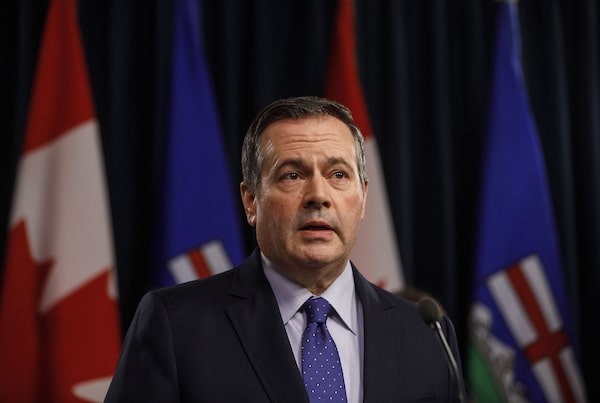
Alberta Premier Jason Kenney speaks to the media in Edmonton on March 20, 2020.JASON FRANSON/The Canadian Press
Albertans will vote in a referendum next year on removing equalization from the Constitution, which Premier Jason Kenney says will give the province leverage as it seeks a new relationship with Ottawa.
The referendum is a key recommendation in a report released by Mr. Kenney’s “Fair Deal” panel, which was struck last year to examine a list of potential changes designed to address the province’s grievances.
Mr. Kenney won last year’s provincial election on a promise to hold such a referendum if several conditions weren’t met, including repealing federal environmental legislation. The Premier says it’s clear that is not going to happen, and he said Albertans deserve a chance to voice their anger over a system that redistributes Albertans’ wealth to provinces such as Quebec, whose government has been hostile to the oil and gas industry.
“Albertans have, broadly, a deep sense of unfairness about how equalization and the whole system of federal transfers work,” Mr. Kenney said.
“I don’t think Albertans are against the principle of equalization in itself – that there should be some degree of sharing across the federation. What they object to is that the formula should be so unfair.”
While the report acknowledges the complex process required to amend the Constitution, Mr. Kenney has argued that court cases connected to the referendum on Quebec sovereignty in the 1990s made it clear the federal government must respond to provincial referendums involving constitutional issues.
He did not say how removing equalization would benefit Alberta or what specific changes to the formula he wants to see, although he has previously called for changes to how non-renewable resource revenue is considered.
Mr. Kenney also repeated his demand for additional money through the federal fiscal-stabilization program, which is designed to compensate provinces that see a sudden drop in revenue, as Alberta did when oil prices collapsed more than five years ago. Mr. Kenney called on Ottawa to lift a cap on those payments and pay Alberta a lump sum of $2.4-billion.
University of Calgary economist Trevor Tombe said the Alberta government’s fiscal challenges have nothing to do with equalization but rather the fact that the province has low taxes and high spending. He said reforming equalization would not change that.
“There does not exist any sensible change that would result in Alberta receiving a dime from equalization, at least right now or in the foreseeable future,” he said.
“Why equalization is the focus of so many Albertans is a really deep puzzle, because it’s a program designed to pay to lower-income provinces. And Alberta is and has been for quite some time the richest province by a very wide margin.”
Critics have pointed out that the current equalization formula, which measures a province’s capacity to raise revenue and uses that to determine equalization payments, was last updated when Mr. Kenney was in cabinet in then-prime minister Stephen Harper’s Conservative government.
NDP Leader Rachel Notley said Mr. Kenney had a chance to fight for Alberta when he was in federal cabinet and failed. She dismissed the report as meaningless.
“It is frankly nothing more than a distraction technique – a way to deflect from the pain this government has caused to everyday families because of this Premier’s failed economic plan,” she said.
“Much of what is contained here is not within this government’s authority or jurisdiction.”
The report includes more than two dozen recommendations, including setting up an Alberta police force to replace the RCMP and leaving the Canada Pension Plan in favour of a provincial pension.
The Premier said the government needs to study those two proposals before deciding how to proceed. He has said no changes would be made to Albertans’ pensions without a referendum.
The report also dismisses the idea of separation from Canada, saying that while public-opinion polling has shown an increase in that sentiment, considering that as an option would not be constructive.
Derek Robinson of the Buffalo Project, an organization focused on a new deal for Alberta and Saskatchewan, praised the report but said the province should be moving faster on the referendum and studying proposals such as a provincial police force.
“There’s more urgency among the public than what the government response shows,” Mr. Robinson said.
Katherine Cuplinskas, press secretary for Deputy Prime Minister Chrystia Freeland, said in an e-mailed statement that the federal government wants to work with premiers to find common ground and agrees that a “strong Alberta is essential for a strong Canada.” The statement did not address any of the recommendations in the report, including the equalization issue.
We have a weekly Western Canada newsletter written by our B.C. and Alberta bureau chiefs, providing a comprehensive package of the news you need to know about the region and its place in the issues facing Canada. Sign up today.
 James Keller
James Keller